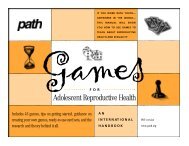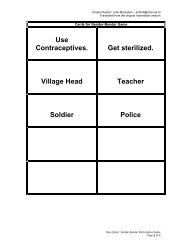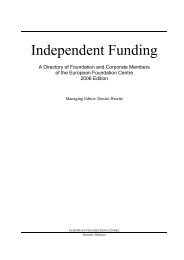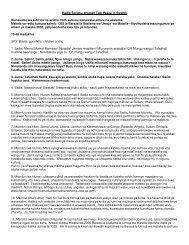Radio Scripts: Women Talk Peace in English African women and ...
Radio Scripts: Women Talk Peace in English African women and ...
Radio Scripts: Women Talk Peace in English African women and ...
You also want an ePaper? Increase the reach of your titles
YUMPU automatically turns print PDFs into web optimized ePapers that Google loves.
<strong>Radio</strong> <strong>Scripts</strong>: <strong>Women</strong> <strong>Talk</strong> <strong>Peace</strong> <strong>in</strong> <strong>English</strong><br />
<strong>African</strong> <strong>women</strong> <strong>and</strong> Resolution 1325 on <strong>women</strong>, peace <strong>and</strong> security<br />
A radio feature on UNSCR 1325 – with excerpts from the 2005 <strong>Peace</strong>build<strong>in</strong>g Cyberdialogues<br />
11.17 m<strong>in</strong>utes<br />
SFX: blasts, gun shots, children cry<strong>in</strong>g<br />
1. Sadia: Mam! Mam! Mamaaaaa! Help! Help me! Somebody….. Help! Anybody! Oh God, Please save my husb<strong>and</strong>. He’s<br />
all I have left. Please God. Please.<br />
2. Juma: Salim! Salim wake up. Come on brother…. I know you can beat this. You are a strong man… it’s just a bullet<br />
wound. Salim! Don’t die on me brother. Don’t do this. Don’t die on me…. What will happen to your wife <strong>and</strong> children?<br />
3. What have I done to deserve this? Just kill me you gun tott<strong>in</strong>g militias hungry for <strong>in</strong>nocent blood.<br />
3. Juma: Sadia please. For the sake of the children, run away <strong>and</strong> save your life. Let go. Salim is no more. They’ve killed<br />
him.<br />
4. I hate you! I hate you! I hate you! - More weep<strong>in</strong>g <strong>in</strong>terspersed with ethnic music---fades down as voice is faded up<br />
5. Narrator (female): A pa<strong>in</strong>ful reality fac<strong>in</strong>g Sadia just reel<strong>in</strong>g from the loss of her husb<strong>and</strong> dur<strong>in</strong>g a militia attack on her<br />
village. Sadia <strong>and</strong> her seven children have just watched militias slit open her husb<strong>and</strong>’s throat <strong>in</strong> a night raid. They are the<br />
latest victims of the war <strong>in</strong> Gulu district of Northern Ug<strong>and</strong>a.<br />
Intersperse with ethnic music—fades down as voice is faded up<br />
6. Narrator (male): A pa<strong>in</strong>ful yet realistic story that people like Sadia go through each day. The reality of wars especially <strong>in</strong><br />
sub Saharan Africa, specifically <strong>in</strong> the horn of Africa <strong>and</strong> the Great Lakes region leaves ma<strong>in</strong>ly <strong>women</strong> <strong>and</strong> children <strong>in</strong><br />
desperate need for answers.<br />
7. Narrator (female): Sierra Leone, Liberia , the Democratic Republic of Congo, Rw<strong>and</strong>a, Angola, Sudan, Ethiopia,<br />
Eritrea, Somalia <strong>and</strong> Northern Ug<strong>and</strong>a—to name a few countries <strong>and</strong> areas emerg<strong>in</strong>g from war, where <strong>women</strong> have been<br />
at the core of the pa<strong>in</strong>, anguish <strong>and</strong> suffer<strong>in</strong>g brought about by the gun. It is not therefore wrong to say that this is the time<br />
for <strong>African</strong> <strong>women</strong> to st<strong>and</strong> up <strong>and</strong> fight aga<strong>in</strong>st war, not by the use of guns <strong>and</strong> machetes, but by justly seek<strong>in</strong>g space at<br />
the peace table.<br />
8. Narrator (male): Over <strong>and</strong> over aga<strong>in</strong>, <strong>women</strong> speak of violence <strong>in</strong> their experiences of war, <strong>and</strong> how war entrenches<br />
violence <strong>in</strong> their communities <strong>and</strong> just how violence is experienced differently by <strong>women</strong> <strong>and</strong> men. Societies become<br />
militarized <strong>in</strong> civil war <strong>and</strong> the militarization l<strong>in</strong>gers on long afterwards. The military sow a culture of violence <strong>in</strong> long wars<br />
that is difficult to eradicate. This violence makes life difficult <strong>and</strong> dangerous for <strong>women</strong>, especially with the diffusion of<br />
cheap small arms.<br />
9. Narrator (female): Violence aga<strong>in</strong>st <strong>women</strong> does not end when treaties are signed to end the war; <strong>in</strong> fact violence<br />
escalates. What can we do to protect ourselves dur<strong>in</strong>g conflict <strong>and</strong> <strong>in</strong> the aftermath? How can we prevent violence? How<br />
can we help <strong>women</strong> heal from the trauma? In Kenya, which is relatively calm <strong>in</strong> comparison to her neighbours, the rape of<br />
girls <strong>and</strong> <strong>women</strong> is on the rise <strong>in</strong> all strata of society.<br />
10. Narrator (male): Until recently one of the most <strong>in</strong>visible aspects of armed conflict is the violence aga<strong>in</strong>st <strong>women</strong>. For<br />
<strong>women</strong> <strong>in</strong> countries where the environment <strong>and</strong> the economy have been devastated by fight<strong>in</strong>g, prostitution may be the<br />
only means of survival. Even <strong>in</strong> refugee camps—supposedly safe from war—forced prostitution is an all too frequent<br />
occurrence. Rape is turned <strong>in</strong>to a weapon of war. Does it always have to be like this?<br />
11. Narrator (Female): No, it doesn’t always have to be like this. What was hidden <strong>and</strong> <strong>in</strong>visible, is now be<strong>in</strong>g discussed<br />
at the highest levels. In October 2000, the United Nations Security Council adopted a revolutionary <strong>in</strong>strument <strong>in</strong><br />
Resolution1325. It is the first resolution ever passed by the Security Council that specifically addresses the impact of war<br />
on <strong>women</strong>, <strong>and</strong> <strong>women</strong>'s contributions to conflict resolution <strong>and</strong> susta<strong>in</strong>able peace.<br />
The resolution emphasizes the role of <strong>women</strong> <strong>in</strong> the prevention of conflict, the importance of <strong>women</strong>’s equal participation<br />
<strong>in</strong> all peace <strong>and</strong> security efforts, <strong>and</strong> the need to protect <strong>women</strong> <strong>in</strong> times of armed conflict. The three “Ps” <strong>in</strong> Resolution<br />
1
1325 –participation, prevention <strong>and</strong> protection--also dem<strong>and</strong>s UN Member States that <strong>women</strong> are represented <strong>in</strong> all<br />
decision-mak<strong>in</strong>g mechanisms <strong>and</strong> processes on peace <strong>and</strong> security issues.<br />
We have with us here Jessica Nkuuhe, Associate Director of Isis WICCE who would expla<strong>in</strong> how they are us<strong>in</strong>g<br />
Resolution 1325 to ensure Ug<strong>and</strong>an <strong>women</strong>’s participation <strong>in</strong> all peace <strong>and</strong> security discussions:<br />
12. Jessica Nkuuhe (JN): Ever s<strong>in</strong>ce Isis-WICCE got <strong>in</strong>volved with the UN Resolution 1325 <strong>and</strong> that was soon after its<br />
pass<strong>in</strong>g <strong>in</strong> October 2000, the organization embarked on ensur<strong>in</strong>g that the <strong>women</strong> themselves understood this resolution.<br />
And therefore as part of our tra<strong>in</strong><strong>in</strong>g, we <strong>in</strong>cluded issues of <strong>in</strong>ternational humanitarian law, <strong>and</strong> also gave <strong>women</strong> skills <strong>in</strong><br />
negotiation, <strong>in</strong> underst<strong>and</strong><strong>in</strong>g, analyz<strong>in</strong>g <strong>and</strong> resolv<strong>in</strong>g conflict, as well as skills <strong>in</strong> advocacy. So that when they are <strong>in</strong>vited<br />
to negotiation tables they will have the requisite skills necessary for the exercise.<br />
At the same time the organization has been <strong>in</strong>volved <strong>in</strong> document<strong>in</strong>g experiences of <strong>women</strong> <strong>in</strong> situations of armed conflict<br />
<strong>and</strong> we can together with other <strong>women</strong> jo<strong>in</strong> the campaign to stop violence aga<strong>in</strong>st <strong>women</strong> <strong>in</strong> situations of armed conflict.<br />
We have been able to produce both pr<strong>in</strong>t <strong>and</strong> video documentaries on the violations of <strong>women</strong>, the specific violations<br />
especially sexual violence, as well as the trauma that <strong>women</strong> experience <strong>in</strong> these situations. We also facilitate Ug<strong>and</strong>an<br />
<strong>women</strong>’s participation <strong>in</strong> <strong>in</strong>ternational discussions such as the <strong>Peace</strong>build<strong>in</strong>g Cyberdialogues that the International<br />
<strong>Women</strong>’s Tribune Centre organized dur<strong>in</strong>g the meet<strong>in</strong>g of the UN Security Council <strong>in</strong> October 2005.<br />
13. Narrator (male): It was mentioned earlier that Resolution 1325 also dem<strong>and</strong>s UN Member States to ensure <strong>women</strong>’s<br />
representation <strong>and</strong> participation <strong>in</strong> all decision-mak<strong>in</strong>g mechanisms <strong>and</strong> processes on peace <strong>and</strong> security issues. We now<br />
have the first <strong>African</strong> woman president <strong>in</strong> Liberia. What is the significance of this Jessica?<br />
14. JN: This is very significant because Ellen Johnson-Sirleaf’s election <strong>in</strong> Liberia has demonstrated what <strong>women</strong> can<br />
achieve when they are organized. And has also demonstrated that both men <strong>and</strong> <strong>women</strong> can have confidence <strong>in</strong> a<br />
woman to lead.<br />
In fact, <strong>in</strong> her <strong>in</strong>augural speech, Ms. Johnson-Sirleaf recognized that it was the power of <strong>women</strong> especially market <strong>women</strong><br />
<strong>and</strong> other <strong>women</strong> at the grassroots level which ensured her victory <strong>in</strong> this elections. Therefore, the contributions of <strong>women</strong><br />
at the grassroots level is very important.<br />
In 2004 for example, Isis WICCE produced a video documentary on unique <strong>women</strong>’s peace <strong>in</strong>itiatives <strong>in</strong> different<br />
countries <strong>in</strong> Africa to show exactly what <strong>women</strong> are do<strong>in</strong>g <strong>in</strong> the area of peacebuild<strong>in</strong>g start<strong>in</strong>g at the grassroots level right<br />
up to the highest level of governance. At the national level with policy makers, on the <strong>African</strong> union level <strong>and</strong><br />
<strong>in</strong>ternationally, there are <strong>women</strong> out there who are capable as leaders <strong>in</strong> conflict resolution <strong>and</strong> <strong>in</strong> peacebuild<strong>in</strong>g as well.<br />
Therefore, these <strong>women</strong> can participate even more ably than men at the peace table. So the excuse of say<strong>in</strong>g that there<br />
are no <strong>women</strong> out there who are capable of participat<strong>in</strong>g <strong>in</strong> peace processes just does not hold water at all.<br />
I must emphasize also the importance of <strong>in</strong>volv<strong>in</strong>g the right <strong>women</strong> <strong>and</strong> tra<strong>in</strong><strong>in</strong>g the right <strong>women</strong>. We must get the right<br />
<strong>women</strong> <strong>in</strong> positions of leadership. Because not every woman who goes <strong>in</strong> this position have the passion to ensure that<br />
<strong>women</strong>’s human rights are protected, are promoted, <strong>and</strong> are respected. Here <strong>in</strong> Ug<strong>and</strong>a for example, whenever we go to<br />
elect <strong>women</strong> leaders, do we ensure that we have put our best <strong>women</strong> <strong>in</strong> these different spaces? Because it’s only when<br />
we have our best <strong>women</strong> that we can make a difference. I know that men out there also mess up the situation but that<br />
doesn’t mean that we cannot <strong>in</strong>clude our best <strong>women</strong>. We <strong>in</strong> Ug<strong>and</strong>a <strong>and</strong> the <strong>African</strong> region have a great responsibility to<br />
ensure that the provisions outl<strong>in</strong>ed <strong>in</strong> this UN Security Council Resolution 1325 are realized.<br />
We need to reach out to as many <strong>women</strong> as possible especially those who live <strong>in</strong> communities affected by armed conflict<br />
so that they can use this resolution to claim their rights <strong>and</strong> space <strong>in</strong> build<strong>in</strong>g peaceful societies.<br />
UN Security Council Resolution 1325 is part of the <strong>in</strong>ternational law. Its dissem<strong>in</strong>ation beg<strong>in</strong>s now. It beg<strong>in</strong>s with us.<br />
15. Be <strong>in</strong>formed, be <strong>in</strong>volved! Support <strong>women</strong>’s participation <strong>in</strong> conflict prevention, resolution <strong>and</strong> peace-build<strong>in</strong>g. Let us<br />
get more of our <strong>African</strong> sisters to the peace tables.<br />
Support <strong>women</strong>’s participation <strong>in</strong> conflict prevention, resolution <strong>and</strong> peace-build<strong>in</strong>g. Write, call, or visit this station to learn<br />
more about the UN Security Council Resolution 1325 <strong>and</strong> how best this could be used <strong>in</strong> your communities.<br />
A message from the International <strong>Women</strong>’s Tribune Centre <strong>in</strong> partnership with the Ug<strong>and</strong>a Media <strong>Women</strong>’s Association<br />
made possible by the support from the Human Security Program <strong>in</strong> the Department of Foreign Affairs <strong>and</strong> International<br />
Trade, Canada;<br />
United Nations Development Fund for <strong>Women</strong>; the Netherl<strong>and</strong>s M<strong>in</strong>istry of Foreign Affairs; <strong>and</strong> this station.<br />
2
Music fades up <strong>and</strong> fades down<br />
written by Lillian Odera<br />
with <strong>in</strong>puts from Mavic Cabrera-Balleza<br />
Charity <strong>and</strong> Nora, two friends build<strong>in</strong>g peace<br />
A radio feature on national action plans on UNSCR 1325.<br />
7.08 m<strong>in</strong>utes<br />
Knock<strong>in</strong>g or sounds at the door to announce a visitor (depend<strong>in</strong>g on the country <strong>and</strong> audience<br />
1. Charity: Hello, hello, is anyone home?<br />
2. Nora: Oh, hello, Charity. Come <strong>in</strong>, come <strong>in</strong>. Sit down. I’ve just put the kettle on.<br />
3. Charity: Thank you, Nora. That’s sounds wonderful. I’ve had a hard day.<br />
4. Nora: It’s soooo good to see you. It’s been a long time. Actually, it’s been a long time s<strong>in</strong>ce any of our friends got<br />
together. But, at last, this conflict may be over. And, those of us who are left can beg<strong>in</strong> to get our lives back together.<br />
5. Charity: Yes, it’s been a horrible period. War <strong>and</strong> violence never get us anywhere. Is your family alright?<br />
6. Nora: Yes, thank God, they all alive <strong>and</strong> reasonably well. And yours?<br />
7. Charity: Yes, my family is f<strong>in</strong>e as well. You know, Nora, that’s one of the reasons I came over today….besides just<br />
want<strong>in</strong>g to see you aga<strong>in</strong>. I’ve been th<strong>in</strong>k<strong>in</strong>g that we’re the lucky ones, <strong>and</strong> we need to f<strong>in</strong>d a way to smooth the road to<br />
peace <strong>in</strong> our country. I wanted to tell you about some new ideas I had.<br />
8. Nora: Sure. You always have wonderful ideas, Charity. What’s happen<strong>in</strong>g?<br />
9. Charity: Well, have you heard about this new UN Resolution 1325?<br />
10. Nora: Yes, I’ve heard about it <strong>in</strong> one of the meet<strong>in</strong>gs <strong>in</strong> our organization. That’s the one about <strong>women</strong>’s participation<br />
<strong>in</strong> peacebuild<strong>in</strong>g, right? But honestly, I don’t know how we can make use of that policy here <strong>in</strong> our country.<br />
11. Charity: Well, I th<strong>in</strong>k the recent developments have been really excit<strong>in</strong>g because now the discussions on Resolution<br />
1325 are focused on develop<strong>in</strong>g national action plans that draw on our experiences <strong>and</strong> perspectives as <strong>women</strong> <strong>and</strong> how<br />
we contribute not only <strong>in</strong> peacebuild<strong>in</strong>g but also <strong>in</strong> the prevention of conflict. The national action plan on 1325 would also<br />
help our government ma<strong>in</strong>ta<strong>in</strong> its commitment to gender equality <strong>in</strong> conflict <strong>and</strong> even dur<strong>in</strong>g a period of post conflict<br />
reconstruction. This also means allocat<strong>in</strong>g funds <strong>and</strong> other resources to support <strong>women</strong>’s peace <strong>in</strong>itiatives at the local<br />
level.<br />
Believe me, Nora I th<strong>in</strong>k we have a tool to help us make more of a difference. It is really groundbreak<strong>in</strong>g for us. Let’s<br />
make sure that the three Ps - protection for <strong>women</strong> <strong>in</strong> conflict situations, prevention of violence, <strong>and</strong> participation of<br />
<strong>women</strong> <strong>in</strong> decision-mak<strong>in</strong>g <strong>and</strong> the peacekeep<strong>in</strong>g, peacebuild<strong>in</strong>g processes happen through the national action plans.<br />
There are a lot of countries <strong>in</strong> Africa where the first two are critical, but, it’s the third one where I th<strong>in</strong>k we can make a<br />
difference. I’ve been th<strong>in</strong>k<strong>in</strong>g about this a lot, <strong>and</strong> I began to talk to a few people.<br />
We need to participate <strong>in</strong> develop<strong>in</strong>g a National Action Plan so we can really participate <strong>in</strong> the peacekeep<strong>in</strong>g afterwards.<br />
And that l<strong>in</strong>ks to the prevention of future conflicts if we have a voice.<br />
12. Nora: You are absolutely right, Charity. They need our voices <strong>and</strong> our perspectives. Look at how <strong>women</strong> suffered <strong>in</strong><br />
this conflict. And our needs are different from men’s. We tried to protect our children. Many of us were raped. Some died.<br />
<strong>Women</strong> could do so much <strong>in</strong> prevent<strong>in</strong>g conflicts <strong>in</strong> the first place…<strong>in</strong> build<strong>in</strong>g the peace, <strong>and</strong> work<strong>in</strong>g towards social<br />
justice after these horrible times.<br />
Work<strong>in</strong>g on a National Action Plan makes a lot of sense. We could really help our government to underst<strong>and</strong> the gender<br />
dimensions of violent conflict—before, dur<strong>in</strong>g, <strong>and</strong> afterwards. How do you see it work<strong>in</strong>g?<br />
3
13. Charity: First of all, it could br<strong>in</strong>g key m<strong>in</strong>istries <strong>and</strong> government departments together who never talk to each other,<br />
let alone about gender. And we could get them talk<strong>in</strong>g to other organizations who would be <strong>in</strong>terested <strong>in</strong> these issues. We<br />
could get our <strong>women</strong>’s groups together to publicize this to make sure we get a role <strong>in</strong> the decision-mak<strong>in</strong>g. Also, the<br />
<strong>women</strong> lawyers, the human rights groups. And don’t forget the important <strong>women</strong> who are already <strong>in</strong> the government. And<br />
we need to f<strong>in</strong>d sympathetic men <strong>in</strong> key positions <strong>and</strong> enlist them as partners.<br />
14. Nora: You know, what is so excit<strong>in</strong>g about this is that a National Action Plan could really be a tool for accountability of<br />
our government.<br />
15. Charity: Yes, <strong>and</strong> the government is beg<strong>in</strong>n<strong>in</strong>g to recognize that civic groups are important <strong>in</strong> implement<strong>in</strong>g some of<br />
their political commitments. I heard some of the other <strong>African</strong> countries are beg<strong>in</strong>n<strong>in</strong>g to use civic groups more effectively.<br />
You know, many th<strong>in</strong>gs the government does <strong>in</strong> reconstruction have profound gender implications, <strong>and</strong> I am sure they<br />
haven’t given it a thought.<br />
16. Nora: So, what do you th<strong>in</strong>k we should do? What are our first steps? Let’s make a list.<br />
17. Charity: First, let’s call some of the other <strong>women</strong>’s <strong>and</strong> other groups, talk to a few people <strong>in</strong>dividually, both men <strong>and</strong><br />
<strong>women</strong>, <strong>and</strong> then see if we can get a meet<strong>in</strong>g.<br />
Music fade…<br />
18. Narrator (male): <strong>Women</strong>—<strong>and</strong> men—like Charity <strong>and</strong> Nora are stirr<strong>in</strong>g all over Africa. F<strong>in</strong>ally they have a tool to use<br />
<strong>in</strong> help<strong>in</strong>g <strong>women</strong> to have a voice—<strong>and</strong> a role <strong>in</strong> the decision-mak<strong>in</strong>g about peacekeep<strong>in</strong>g <strong>and</strong> peacebuild<strong>in</strong>g. You <strong>and</strong><br />
your group, your community can have a voice. And you can help all <strong>women</strong> have a voice. <strong>Women</strong> are hurt by conflict <strong>in</strong><br />
many ways…ways very different from men. <strong>Women</strong> deserve a chance to use their skills <strong>and</strong> wisdom to help prevent<br />
conflicts, to protect themselves <strong>and</strong> girls <strong>in</strong> conflict situations, <strong>and</strong> <strong>women</strong> should play a big role <strong>in</strong> reconstruction <strong>and</strong><br />
peacekeep<strong>in</strong>g.<br />
19. Narrator (female): Be <strong>in</strong>formed, be <strong>in</strong>volved! Support <strong>women</strong>’s participation <strong>in</strong> conflict prevention, resolution <strong>and</strong><br />
peace-build<strong>in</strong>g. Let us get more of our <strong>African</strong> sisters to the peace tables.<br />
Support <strong>women</strong>’s participation <strong>in</strong> conflict prevention, resolution <strong>and</strong> peace-build<strong>in</strong>g. Write, call, or visit this station to learn<br />
more about the UN Security Council Resolution 1325 <strong>and</strong> how best this could be used <strong>in</strong> your communities.<br />
A message from the International <strong>Women</strong>’s Tribune Centre <strong>in</strong> partnership with the Ug<strong>and</strong>a Media <strong>Women</strong>’s Association<br />
(UMWA) made possible by the support from the Human Security Program <strong>in</strong> the Department of Foreign Affairs <strong>and</strong><br />
International Trade, Canada; United Nations Development Fund for <strong>Women</strong>; the Netherl<strong>and</strong>s M<strong>in</strong>istry of Foreign Affairs;<br />
<strong>and</strong> this station.<br />
Music fades up <strong>and</strong> fades down<br />
Written by Maggie Range<br />
With <strong>in</strong>puts form Mavic Cabrera-Balleza<br />
Did You Know?<br />
Curta<strong>in</strong> raiser (radio plug/public service announcement) on UNSCR 1325<br />
1:46 m<strong>in</strong>utes<br />
Did you know that five years ago the United Nations Security Council passed a groundbreak<strong>in</strong>g resolution on <strong>women</strong>,<br />
peace <strong>and</strong> security? That resolution, Resolution 1325, calls for <strong>women</strong>’s participation <strong>in</strong> conflict prevention, resolution,<br />
<strong>and</strong> peace-build<strong>in</strong>g<br />
This resolution is timely. The worst victims of armed conflict are mostly <strong>women</strong> <strong>and</strong> children. In the years 2003-2005 for<br />
<strong>in</strong>stance, 13,000 children were abducted from the districts of Gulu, Kitgum <strong>and</strong> Pader <strong>in</strong> Northern Ug<strong>and</strong>a, follow<strong>in</strong>g a<br />
brutal war rag<strong>in</strong>g between the Lord’s Resistance Army <strong>and</strong> government troops <strong>in</strong> the region.<br />
It is aga<strong>in</strong>st this background that <strong>women</strong> should be part of resolv<strong>in</strong>g conflicts. Resolution 1325 calls for <strong>women</strong>’s<br />
participation <strong>in</strong> decision-mak<strong>in</strong>g <strong>in</strong> peace negotiation panels.<br />
This is easier said than done. We <strong>women</strong> have been taught that issues of peace <strong>and</strong> security are solely men’s bus<strong>in</strong>ess.<br />
Men don’t th<strong>in</strong>k <strong>women</strong> belong at the peace table <strong>and</strong> we <strong>women</strong> don’t see ourselves there either. This has to change.<br />
4
Support <strong>women</strong>’s participation <strong>in</strong> conflict prevention, resolution <strong>and</strong> peace-build<strong>in</strong>g. Write, call, or visit this station to learn<br />
more about the UN Security Council Resolution 1325.<br />
A message from the International <strong>Women</strong>’s Tribune Centre <strong>in</strong> partnership with the Ug<strong>and</strong>a Media <strong>Women</strong>’s Association<br />
made possible by the support from the Human Security Program <strong>in</strong> the Department of Foreign Affairs <strong>and</strong> International<br />
Trade, Canada; United Nations Development Fund for <strong>Women</strong>; the Netherl<strong>and</strong>s M<strong>in</strong>istry of Foreign Affairs; <strong>and</strong> this<br />
station.<br />
Written by Mavic Cabrera-Balleza<br />
5


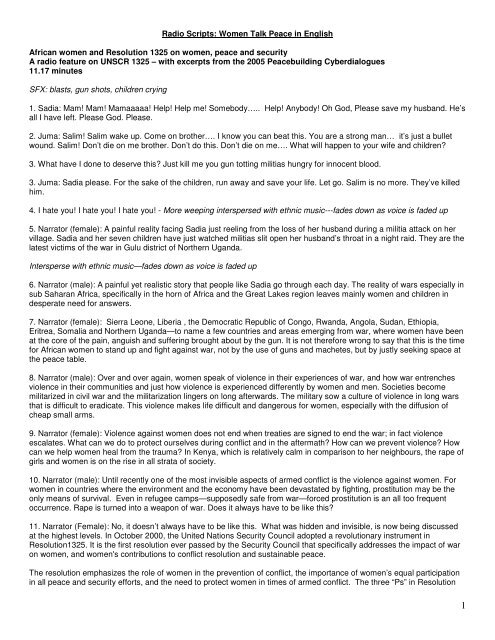
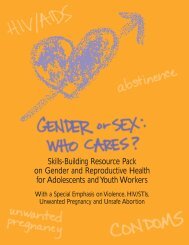
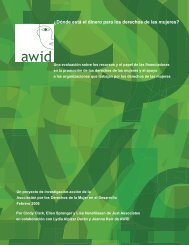
![Girls, HIV/AIDS and Education [PDF] - library.unesco-ii...](https://img.yumpu.com/40728741/1/190x245/girls-hiv-aids-and-education-pdf-libraryunesco-ii.jpg?quality=85)
